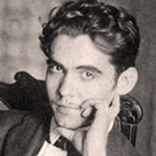 Federico del Sagrado Corazón de Jesús García Lorca, known as Federico García Lorca; June 5, 1898 – August 19, 1936) was a Spanish poet, playwright, and theatre director.
Federico del Sagrado Corazón de Jesús García Lorca, known as Federico García Lorca; June 5, 1898 – August 19, 1936) was a Spanish poet, playwright, and theatre director.
García Lorca achieved international recognition as an emblematic member of the Generation of ’27, a group consisting of mostly poets who introduced the tenets of European movements (such as symbolism, futurism, and surrealism) into Spanish literature.
He was executed by Nationalist forces at the beginning of the Spanish Civil War. His body has never been found. In 2008, a Spanish judge opened an investigation into Lorca’s death. The García Lorca family eventually dropped objections to the excavation of a potential gravesite near Alfacar, but no human remains were found.
DAWN
Federico Garcia Lorca
Dawn in New York has
four columns of mire
and a hurricane of black pigeons
splashing in the putrid waters.
Dawn in New York groans
on enormous fire escapes
searching between the angles
for spikenards of drafted anguish.
Dawn arrives and no one receives it in his mouth
because morning and hope are impossible there:
sometimes the furious swarming coins
penetrate like drills and devour abandoned children.
Those who go out early know in their bones
there will be no paradise or loves that bloom and die:
they know they will be mired in numbers and laws,
in mindless games, in fruitless labors.
The light is buried under chains and noises
in the impudent challenge of rootless science.
And crowds stagger sleeplessly through the boroughs
as if they had just escaped a shipwreck of blood.
=============
ROMANCE SONAMBULO
Federico Garcia Lorca
Green, how I want you green.
Green wind. Green branches.
The ship out on the sea
and the horse on the mountain.
With the shade around her waist
she dreams on her balcony,
green flesh, her hair green,
with eyes of cold silver.
Green, how I want you green.
Under the gypsy moon,
all things are watching her
and she cannot see them.
Green, how I want you green.
Big hoarfrost stars
come with the fish of shadow
that opens the road of dawn.
The fig tree rubs its wind
with the sandpaper of its branches,
and the forest, cunning cat,
bristles its brittle fibers.
But who will come? And from where?
She is still on her balcony
green flesh, her hair green,
dreaming in the bitter sea.
—My friend, I want to trade
my horse for her house,
my saddle for her mirror,
my knife for her blanket.
My friend, I come bleeding
from the gates of Cabra.
—If it were possible, my boy,
I’d help you fix that trade.
But now I am not I,
nor is my house now my house.
—My friend, I want to die
decently in my bed.
Of iron, if that’s possible,
with blankets of fine chambray.
Don’t you see the wound I have
from my chest up to my throat?
—Your white shirt has grown
thirsty dark brown roses.
Your blood oozes and flees a
round the corners of your sash.
But now I am not I,
nor is my house now my house.
—Let me climb up, at least,
up to the high balconies;
Let me climb up! Let me,
up to the green balconies.
Railings of the moon
through which the water rumbles.
Now the two friends climb up,
up to the high balconies.
Leaving a trail of blood.
Leaving a trail of teardrops.
Tin bell vines
were trembling on the roofs.
A thousand crystal tambourines
struck at the dawn light.
Green, how I want you green,
green wind, green branches.
The two friends climbed up.
The stiff wind left
in their mouths, a strange taste
of bile, of mint, and of basil
My friend, where is she—tell me—
where is your bitter girl?
How many times she waited for you!
How many times would she wait for you,
cool face, black hair,
on this green balcony!
Over the mouth of the cistern
the gypsy girl was swinging,
green flesh, her hair green,
with eyes of cold silver.
An icicle of moon
holds her up above the water.
The night became intimate
like a little plaza.
Drunken “Guardias Civiles”
were pounding on the door.
Green, how I want you green.
Green wind. Green branches.
The ship out on the sea.
And the horse on the mountain.